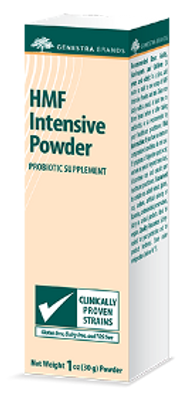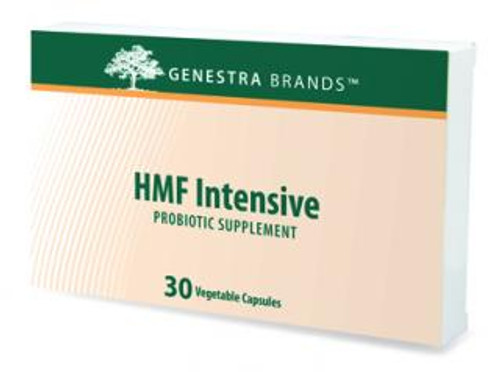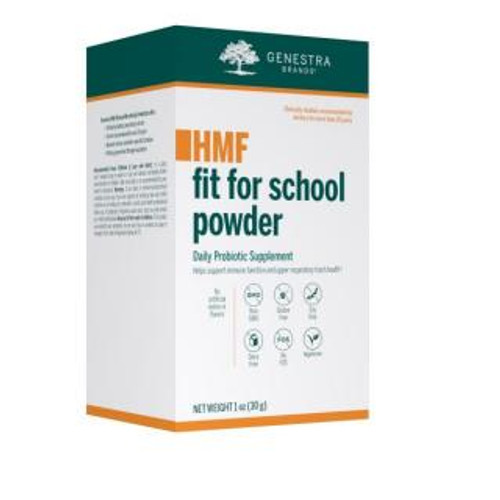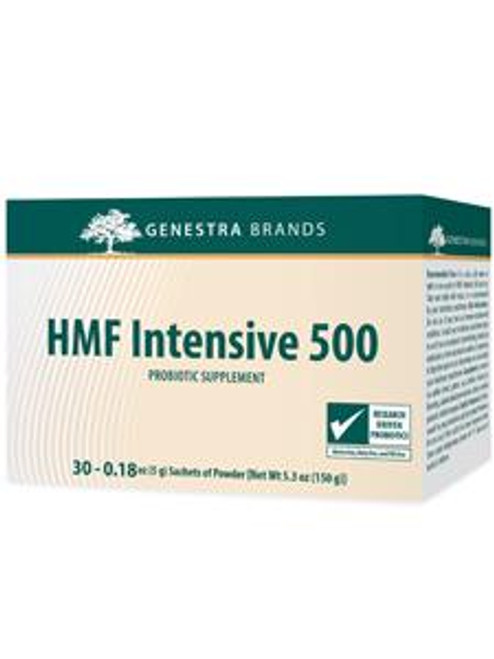Product Overview
Genestra HMF Intensive Powder- 1 oz (30 gm)
Highly concentrated probiotic formula 25 billion CFU Helps reduce symptoms associated with intestinal discomfort(1) Easy-to-use powder formula for long-term maintenance Quickly dissolves in liquid
HMF Intensive Powder is a highly concentrated probiotic formula, which provides two strains of proprietary human-sourced Lactobacillus acidophilus, Bifidobacterium bifidum and Bifidobacterium animalis subsp. lactis in a single daily-dose powder to support the restoration of friendly intestinal flora. It is fructo-oligosaccharide-free and HMF Intensive Powder is highly recommended after completion of the HMF Replete program.
Additional product info: The effects of probiotic supplementation on the intestinal re-growth microbiota following antibiotic therapy were studied in another double-blind placebo-controlled study. The probiotic product (Cultech Ltd., Port Talbot, UK) comprised two strains of Lactobacillus acidophilus (CUL60 and CUL21) and two strains of Bifidobacterium spp. at a total of 2.5 X 1010 colony-forming units (CFU)/capsule, and the placebo comprised an inactive carrier (maltodextrin). Patients received one capsule daily. In the placebo group, numbers of facultative anaerobes and enterobacteria increased significantly, and at day 35 the numbers were significantly higher in the placebo group than in the active group; in the active group, the numbers of bacteroides increased significantly. Although the numbers of enterococci in both groups did not change, in the placebo group the number of patients harbouring antibiotic-resistant enterococci post therapy increased significantly. From this study, it would appear that daily supplementation with viable probiotic bacteria during and post antibiotic therapy reduces the extent of disruption to the intestinal microbiota as well as the incidence and total numbers of antibiotic-resistant strains in the re-growth population.(1)
In a pilot-scale, double-blind, placebo-controlled trial, 30 patients with Helicobacter pylori infection were randomised into three groups prior to their 7 days eradication therapy, to study the effects of probiotic supplement comprising Lactobacillus acidophilus and Bifidobacterium bifidum on the intestinal microflora in response to antibiotic therapy. Group I received the placebo product from day 1 to day 15, Group II received placebo from day 1 to day 7 and probiotics from day 8 to day 15 and Group III received probiotics from day 1 to day 15. Patients took one probiotic or placebo capsule daily with food, according to their group. A commercially available probiotic product was provided by Cultech Ltd (Swansea, UK) and comprised two strains of Lactobacillus acidophilus (CLT60 and CUL21) and two strains of Bifidobacterium bifidum (CUL17 and B. bifidum Rhodia, New Jersey, USA) at a total of 2.5 x 1010 colony forming units (cfu)/capsule. The placebo comprised an inert carrier (maltodextrin, Cultech Ltd). Patients provided stool samples for analysis on days 1, 7, 12, 17 and 27. For patients in Groups I and II, significant increases in the facultative anaerobe component of the microflora occurred between days 1 and 7. In Group I, the numbers remained elevated to day 27 but in Group II, the numbers decreased significantly between days 7 and 27 back to the starting levels. In Group III, the facultative anaerobe population remained stable throughout. The total anaerobe numbers increased significantly at day 27 than at day 1 for Group I, were unchanged throughout for Group II and decreased significantly for the patients in Group III between days 1 and 7 before reverting to the starting levels by day 27. From these results, it can be seen that probiotic supplementation modulates the response of the intestinal microflora to the effects of antibiotic therapy.(2)
The efficacy of probiotics in alleviating the symptoms of irritable bowel syndrome (IBS) appears to be both strain- and dose-related. The aim of a study was to investigate the effect of LAB4, a multistrain probiotic preparation on symptoms of IBS. This probiotic preparation has not previously been assessed in IBS. Fifty-two participants with IBS, as defined by the Rome II criteria, participated in this double blind, randomized, placebo-controlled study. Participants were randomized to receive either a probiotic preparation comprising two strains of Lactobacillus acidophilus CUL60 (NCIMB 30157) and CUL21 (NCIMB 30156), Bifidobacterium lactis CUL34 (NCIMB 30172) and Bifidobacterium bifidum CUL20 (NCIMB 30153) at a total of 2.5 ?? 10(10) cfu/capsule or a placebo for 8 weeks. Subjects were asked to complete a validated questionnaire to assess IBS symptoms at baseline and fortnightly throughout the 8 week study period. The questionnaire assessed severity and duration of abdominal pain (abdominal pain, days with pain), abdominal distension (bloating), satisfaction with bowel habits and quality of life. Following results were noted:
1. The number of days with pain improved significantly by week 2 in the probiotic group, but did not reduce significantly for the placebo group until 4 weeks into the study. 2. The severity of abdominal pain reduced significantly in both groups from week 4 onwards. 3. Significant improvements in quality of life were recorded for those receiving the probiotic at the end of the intervention period and this was associated with significantly improved satisfaction with bowel habit for the probiotic subjects over the placebo group at 6 weeks.
Significant improvements from baseline for symptoms severity score were seen throughout the intervention period in both active and placebo groups from weeks 2. Comparison of the effectiveness of the probiotic in the presence of significant placebo effect in this study showed a significant difference in the Symptom Severity Score in favour of the probiotic at 6 weeks and 8 weeks but by 2 weeks after the 8 weeks of the intervention, no significant difference could be detected between the probiotic and placebo group. LAB4 multistrain probiotic supplement may benefit subjects with IBS.(3)









